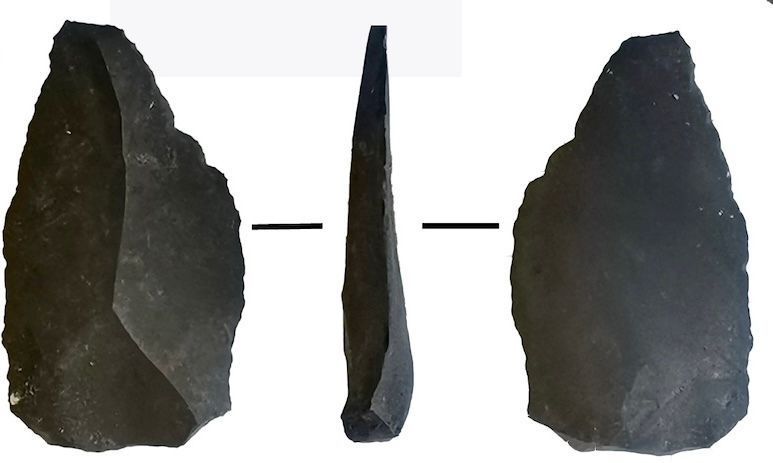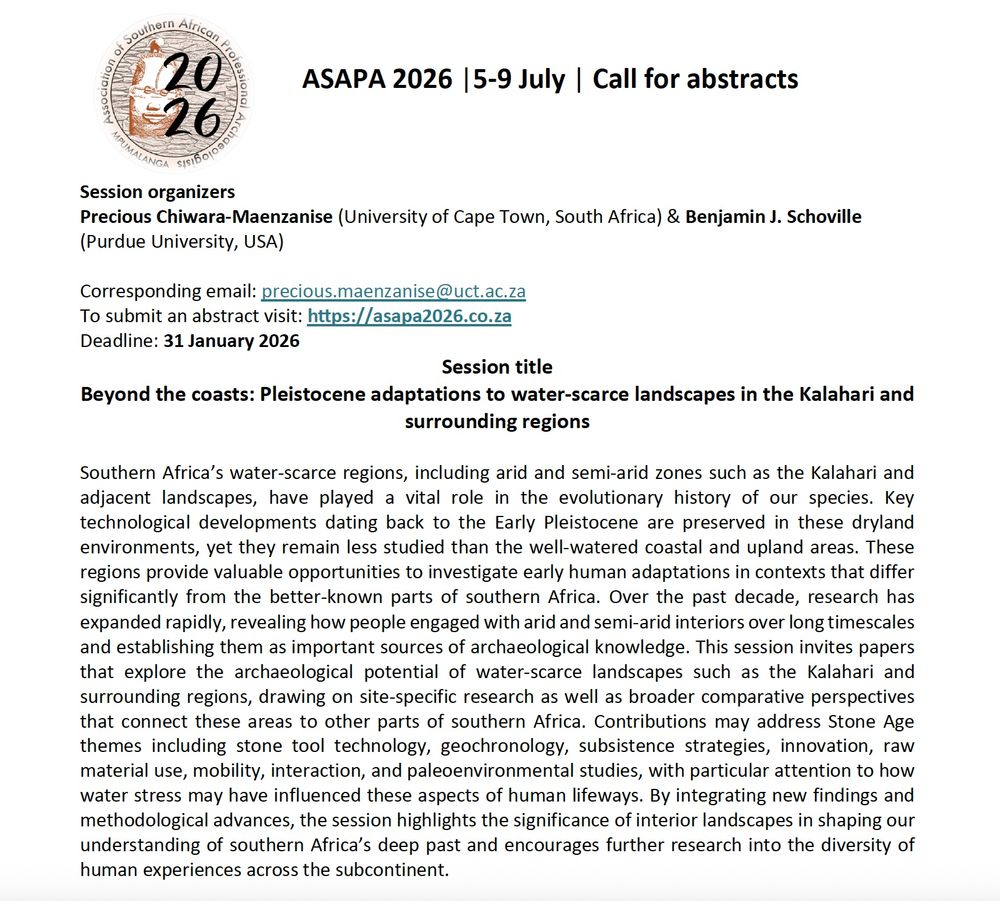

HERI Master’s student Marang Keebine studies past #climate & environmental change using sediments from an ancient lake in the Karoo.
Her work sheds light on how dry landscapes responded to drought and rainfall – and how we can respond today.

HERI Master’s student Marang Keebine studies past #climate & environmental change using sediments from an ancient lake in the Karoo.
Her work sheds light on how dry landscapes responded to drought and rainfall – and how we can respond today.
The study identified 2 Myr-old proteins from Paranthropus robustus, revealing biological sex & genetic variability
sajs.co.za/article/view...

The study identified 2 Myr-old proteins from Paranthropus robustus, revealing biological sex & genetic variability
sajs.co.za/article/view...
We invite abstracts for our session on the Pleistocene record of the Kalahari and interior southern Africa, including comparative studies with other regions of southern Africa or Africa.
Submit via the ASAPA portal: asapa2026.co.za/submissions....

We invite abstracts for our session on the Pleistocene record of the Kalahari and interior southern Africa, including comparative studies with other regions of southern Africa or Africa.
Submit via the ASAPA portal: asapa2026.co.za/submissions....
Early humans in #SouthAfrica were making spears 500,000 years ago.
These stone points from the #archaeology site of Kathu Pan 1 have impact damage, hafting marks & shapes perfectly suited for spear use — revealing surprisingly advanced weapon technology.

Early humans in #SouthAfrica were making spears 500,000 years ago.
These stone points from the #archaeology site of Kathu Pan 1 have impact damage, hafting marks & shapes perfectly suited for spear use — revealing surprisingly advanced weapon technology.
Evidence shows that early humans didn’t just endure it; they adapted with remarkable skill.
🔗 www.heriuct.co.za/news-content/surviving-the-drylands-stone-tools-as-evidence-of-early-social-networks

Evidence shows that early humans didn’t just endure it; they adapted with remarkable skill.
🔗 www.heriuct.co.za/news-content/surviving-the-drylands-stone-tools-as-evidence-of-early-social-networks
Looking at context & patterns, the paper sheds light on the deep roots of human cooperation & collaboration.
doi.org/10.17159/saj...

Looking at context & patterns, the paper sheds light on the deep roots of human cooperation & collaboration.
doi.org/10.17159/saj...
Christina Mutinda, a HERI PhD candidate at @UCT_news, explores how early humans adapted to changing environments.
Using fossils, isotopes and ecological clues, she reconstructs East Africa’s Early Pleistocene habitats, when Paranthropus boisei roamed.

Christina Mutinda, a HERI PhD candidate at @UCT_news, explores how early humans adapted to changing environments.
Using fossils, isotopes and ecological clues, she reconstructs East Africa’s Early Pleistocene habitats, when Paranthropus boisei roamed.
Published with our Dr Tara Edwards, the review highlights advances & potential for carbonate geochronology — and the implications for #humanevolution research.
www.heriuct.co.za/news-content...


Published with our Dr Tara Edwards, the review highlights advances & potential for carbonate geochronology — and the implications for #humanevolution research.
www.heriuct.co.za/news-content...
📖 Read more at
www.sciencedirect.com/science/arti...

📖 Read more at
www.sciencedirect.com/science/arti...
Researchers working in these regions are invited to submit abstracts and join the discussion.
asapa2026.co.za


Researchers working in these regions are invited to submit abstracts and join the discussion.
asapa2026.co.za
The paper reviews how stone tools reveal social connections, noting similar patterns can also arise independently and suggesting ways to better distinguish the two. 💫
🔗 doi.org/10.17159/saj...

The paper reviews how stone tools reveal social connections, noting similar patterns can also arise independently and suggesting ways to better distinguish the two. 💫
🔗 doi.org/10.17159/saj...
Find out in our new podcast, which tells the story of how one fossil challenged colonial narratives & scientific authority to show human origins lie in #Africa
Listen to all episodes now🔊
www.heriuct.co.za/news-content...
Find out in our new podcast, which tells the story of how one fossil challenged colonial narratives & scientific authority to show human origins lie in #Africa
Listen to all episodes now🔊
www.heriuct.co.za/news-content...
Ben Schoville and I are organising a session on Pleistocene adaptations in the Kalahari and other interior drylands of southern Africa.
Working in these landscapes? We’d love your contribution.
Submit here: asapa2026.co.za
Deadline: 31 Jan 2026


Ben Schoville and I are organising a session on Pleistocene adaptations in the Kalahari and other interior drylands of southern Africa.
Working in these landscapes? We’d love your contribution.
Submit here: asapa2026.co.za
Deadline: 31 Jan 2026
Led by Dr. Palesa Madupe of the University of Copenhagen and UCT’s HERI, this study provides the oldest human genetic data from Africa.
🔗 www.science.org/doi/10.1126/...

Led by Dr. Palesa Madupe of the University of Copenhagen and UCT’s HERI, this study provides the oldest human genetic data from Africa.
🔗 www.science.org/doi/10.1126/...
New work, led by HERI’s Georgina Luti, counters arguments that the flowstones are uniform & intrusive, adding support for their role in dating fossils.
🔗 www.heriuct.co.za/news-content...

New work, led by HERI’s Georgina Luti, counters arguments that the flowstones are uniform & intrusive, adding support for their role in dating fossils.
🔗 www.heriuct.co.za/news-content...
🎧 Unburied Season 2: The Taung Child from HERI and ARC explores its history and legacy.
Listen here 👉 linktr.ee/arcdocs
🎧 Unburied Season 2: The Taung Child from HERI and ARC explores its history and legacy.
Listen here 👉 linktr.ee/arcdocs

A great opportunity for students in archaeology & heritage management.
📅 6–10 Dec 2025
See details on SAASS social media & website: www.saassarchaeology.com/upcoming-eve...

A great opportunity for students in archaeology & heritage management.
📅 6–10 Dec 2025
See details on SAASS social media & website: www.saassarchaeology.com/upcoming-eve...
An all-women research team, led by HERI’s Georgina Luti, has revealed how rock layers called speleothems record shifts in Africa’s past and help us date fossils more reliably.
#WomenInScience & rooted in Africa.

An all-women research team, led by HERI’s Georgina Luti, has revealed how rock layers called speleothems record shifts in Africa’s past and help us date fossils more reliably.
#WomenInScience & rooted in Africa.

Our new podcast takes you back to 1924 #SouthAfrica, where one fossil would upend colonial narratives to centre human origins #Africa.
🌍Unburied Season 2: The Taung Child
🔗 Listen: linktr.ee/arcdocs

Our new podcast takes you back to 1924 #SouthAfrica, where one fossil would upend colonial narratives to centre human origins #Africa.
🌍Unburied Season 2: The Taung Child
🔗 Listen: linktr.ee/arcdocs
Commemorate 100 years since the fossil centred human origins in #Africa by listening NOW!
Unburied Season 2🔗 Listen linktr.ee/arcdocs
Commemorate 100 years since the fossil centred human origins in #Africa by listening NOW!
Unburied Season 2🔗 Listen linktr.ee/arcdocs




